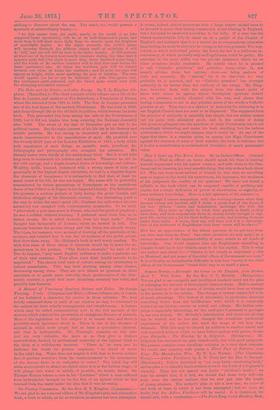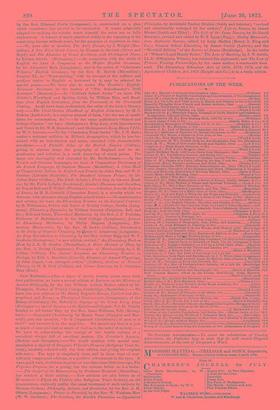Smoot. Boors.—Alexander the Great in the Punjaub, from Arrian. Book
V. With Notes. By the Rev. C. C. Moberly. (Rivingtons.) We are glad to see energetic and intelligent teachers carry out the plan of enlarging the interest of their pupils' classical study. Half-a-century ago the history, if not the name, of Arrian would have been as strange to the master as to the scholar. The change of system cannot fail to bo of much advantage. The history of Alexander, in particular, deserves something better than the indifference with which it is commonly treated in our history courses at school and college. His Indian cam- paign is especially interesting, for the analogies it presents to passages in our own history. Mr. Moberly's introduction and notes are all that can be wished, and he has also changed the occasional unclassical expressions of his author into what the usage of the best time demands. With this may be classed an addition to another useful and well-executed series of which wo have before spoken with praise, Scenes from Euripides : The Bacchus, by A. Sidgwick. (Rivingtons.) Mr. Sidgwick has shortened the play considerably, but with good judgment. His preface contains some excellent criticism in a very short compass. We would also mention with praise a Third Part of Extracts from Livy : The Macedonian War. By W. Lee Warner. (The Clarendon Press.)—Aditus Faciliores, by A. W. Potts and the Rev. C. Darnell. (Blackwood.) This is described as "an easy Latin construing-book," and its plan is to simplify Latin authors down to the level of a beginner's capacity. Time has not spared any Latin "children's books ;" we may be certain that, if it had, we should find them very different from even the easiest authors that we now put into the hands of young scholars. The author's plan is not a new one ; we know of one book, at least, in which it has been attempted ; but we have no doubt that the Aditus Faciliores will be useful. It is furnished, we should add, with a vocabulary.—The First Easy Greek Reading Book, by the Rev. Edmund Fowle (Longmans), is constructed on a plan which experience has proved to be successful. It seems admirably adapted for making the scholar teach himself, the notes are so fully explanatory. A feature of much practical utility is the repeating of the construing lessons without notes, for the purposes of repetition in class. —We have also to mention The Attic Primer, by J. Wright (Mac- millan), A New First Greek Course, by Thomas A. Stewart (Oliver and Boyd), and The Elements of Greek Accidence, with Philological Notes, by Evelyn Abbott. (Rivingtons.)—In connection with the study of English wo have A Companion to the Higher English Grammar, by Dr. Alexander Bain (Longmans); and in the series of "Literature Primers," English Grammar, by the Rev. R. Morris (Macmillan); Chapter XL, on "Word-making," with its account of the suffixes and prefixes native to English or borrowed by it, may be selected for special praise.—We have also to notice The Teacher's English- Grammar Assistant, by the Author of "The Schoolmaster's Drill Assistant." (Bemrose.)—In 0° Collins's School Series " we have The Scholar's Word-book and Spelling Guide, by William Rice, and Read- ings from English Literature, from the Fourteenth to the Nineteenth Century. As all have been modernised, the value of the book is literary only.—The Civil-Service Handbook of English Literature, by H. C. Dobson (Lockwood), is a copious manual of facts, "for the use of candi- dates for examination, &c."—In the same publisher's "School and College Classics " we have Shakespeare's King Lear, with Introduction and Notes by Dr. W. B. Kemshead ; and Shakespeare's King Henry VIII., by W. S. Lawson.—To the "Clarendon Press Series" Mr. J. W. Hales makes a welcome addition in Milton's Areopagitica, which he has fur- nished with an introduction and notes, executed with characteristic excellence.—A Portable Atlas of the British Empire (Collins), giving in sixteen maps the geography of England and its de- pendencies and colonies, is a work deserving of much praise. The maps are thoroughly well executed by Mr. Bartholomew.-In the French and German languages, we have A Compendious Dictionary of the French Language, by Gustave Masson (Macmillan), A Class-Book of Comparative Idioms in English and French, by Jules Brie and W. C. Sanders (Librairo Hachette), The Standard German Primer, by Dr. Julius Maier (Collins), The Little Scholar's First Step in German Read- ing, by Mr. Feick Lebahn (Lockwood), Goethe's Hermann and Dorothea, by Ernest Bell and E. Wolfe] (Whittaker).---Selections from the Inferno of Dante, by H. B. Cotterill (Clarendon Press), is a novelty which we welcome with pleasure among English school-books.—In mathematics and science, we have An Elementary Treatise on the Integral Calculus, by B. Williamson, Fellow and Tutor of Trinity College, Dublin (Long- mans), Elementary Dynamics, by William Garnett (Heighten, Bell, and Co. ; Bell and Sons), Theoretical Mechanics, by the Rev. J. F. Twisden, Professor of Mathematics in the Staff College (Longmans), Lessons in Elementary Mechanics, by Philip Magnus (Longmans), Ele- mentary Mensuration, by the Rev. H. Lewis (Collins), Introduction to the Study of Organic Chemistry, by genry C. Armstrong (Longmans), An Easy Introduction to Chemistry, by the Rev. Arthur Rigg and W. T. Goodwin (Rivingtons), " a new edition, revised ;" An Elementary Book on Heat, by J. E. H. Gordon (Macmillan), A Short Manual of Heat, by the Rev. A. Irving (Longmans), Principles of Metal-mining, by J. H. Collins (Collins), The Animal Kingdom, an Elementary Treatise in Zoology, by Ellis A. Davidson (Cassell), Elements of Animal Physiology, by John Angels, " an enlarged edition " (Collins), Outlines of Natural History, by H. H. Dick (Collins), and Linear Drawing, by C. Christian Mast (Bean).



































 Previous page
Previous page